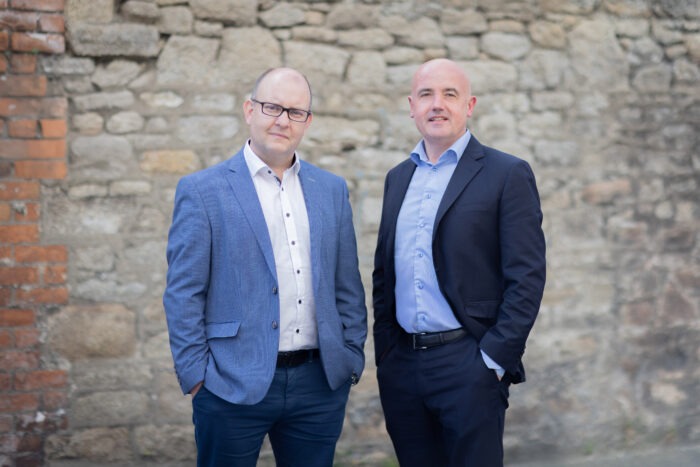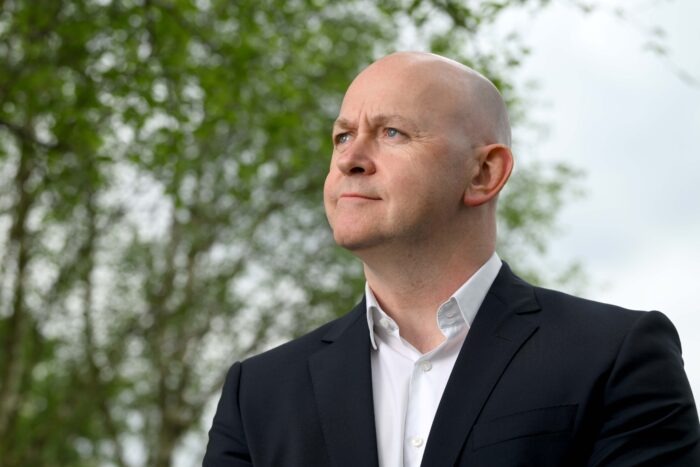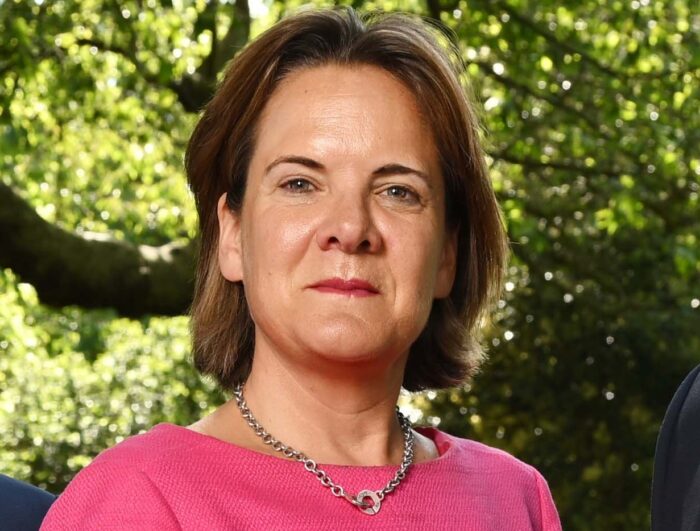Each year, the Real Deal brings together hundreds of entrepreneurs, dealmakers, and investors to a packed venue at Goffs, Co Kildare — not for fanfare or profit, but to exchange ideas, share stories, and spark the kind of conversations that drive business deals.
And as the 2025 edition approaches — the attendance is expected to top the 1,000 mark this year — the timing couldn’t feel more relevant.
The mood music around M&A and private equity has shifted. Uncertainty is swirling: economic, geopolitical, regulatory. Yet among those closest to the action, there is cautious optimism. The deals are still happening. The ambition is still there. Good companies are still in demand.
Few understand that better than Brendan Traynor and Noel Winters.
Traynor is a co-founder and director with Renatus Private Equity Partners, an Irish private-equity firm that has raised €110 million from investors through three separate funds and which has nine companies in its current portfolio.
Winters, meanwhile, is a corporate finance partner with Fitzgerald Power, the fast-growing Irish accountancy firm. Both men and their companies have been involved with the SME-focused conference since its inception.
The world has changed a lot since the first edition in 2018, but even now, amid the shifting geopolitical winds and rising uncertainty around tariffs, both Winters and Traynor point to an underlying bullishness in the Irish M&A landscape.

For Winters, the road to corporate finance came through a more traditional path: numbers, audits, and a growing client base of SMEs looking to grow, exit, or acquire.
“I would have come with an auditing and accounting background,” he says. “Over the course of my career, Fitzgerald Power as a business has evolved in its own right.
“So with that evolution, deals become ever more prevalent internally as part of our growth. It’s certainly something that I have always taken an interest in, and it was a natural dovetail for me to support the SME community, which is a large part of our client base in M&A transactions. I always enjoyed that cut and thrust of being at the forefront of a client’s life decisions.”
Traynor’s journey had a different spark, one that came from a map on a wall in Co Louth.
“I did a BComm in UCD, and always thought I wanted to go straight into business,” he says. “So growing up in Co Louth, we were spoiled with some great entrepreneurs: Martin Naughten, Larry Goodman, Neil McCann and multiple others.”
He joined Naughten’s electrical consumer goods giant Glen Dimplex on the graduate recruitment programme and was based in Dunleer, Co Louth.
“They are a very acquisitive company. It was great looking at the map, they were acquiring in Canada, Europe, Asia and beyond. So that was really my light-bulb moment,” he says.
From there, it was into corporate finance with BDO and mentors like Paul Keenan and the late great Hugh Cooney — “a great inspiration” — before ultimately founding Renatus with his business partner Mark Flood in 2014.
Deals, diligence, and a changing tempo
2024 ended with strength. According to data from Renatus, there was a nine per cent increase in deals completed last year, with 464 deals in 2024 compared to 427 in 2023.
2025 is shaping up to be more complex. However, in the first quarter alone, 132 deals were completed — a 39 per cent jump from the same period last year, according to the latest M&A report by Renatus.
Both Winters and Traynor argue that Ireland’s M&A landscape is being boosted by an active private-equity community and several sectoral trends, although they do expect a tempering in activity later in the year due to uncertainty.
That theme — uncertainty — is one that Winters echoes, particularly when it comes to how deals are being executed.
“There’s an absolute focus on due diligence now, at the commercial level, the IT level, the people level,” he says. “The time span of completing a deal has probably extended a little bit because of that additional scrutiny. What I think might be happening in Q1 is somewhat of a mop-up from the previous year. I’m still very bullish about the rest of 2025, but a slight tempering may happen.”
For Traynor, it’s sectoral. “There’s a huge amount of activity in infrastructure, financial services, construction, and tech/software. But certain sectors, I think, will be somewhat hamstrung until the medium to long-term landscape becomes clear, particularly with something as blunt as tariff imposition.”
The hot sectors: tech, services, and Irish ambition
So what’s in vogue in 2025? The answer is layered. Fragmentation in ownership across SMEs is leading to consolidation plays. Tech is booming. And services, especially regulated ones, are seeing high levels of investor interest.
“Technology, SaaS companies, dental, and veterinary,” says Winters. “And these sectors are at the centre of consolidation plays. The environment in Ireland is still a very solid stable one to do business in”.
Traynor picks up that thread. “There is a huge amount happening in financial services: wealth management, insurance, accountancy, regulation. Tech and software. I think the whole data centre and its value chain have provided the platform for another wave of Irish entrepreneurial success. ‘Paddy built the motorways, now Paddy is building the cloud’. Renewables are huge also. Pharma and tech will still be big despite current uncertainty. We’re still a great gateway to Europe.”
But it’s not just about sectors. It’s about energy and ambition. And Ireland, they say, has it in spades.
“One of the biggest catalysts for the Real Deal success is highlighting the number of entrepreneurs we are producing in terms of tech spin-offs, the data-centre value chain, pharma and many others, and providing a platform to hear their stories in Goffs,” says Traynor, who also pays tribute to longstanding partner Bank of Ireland for its support for the vent. “There is an energy and desire to get off the island and go -an-European and global from our entrepreneurs, which is truly inspirational.”
The rise of private equity: mentorship as well as money
Private equity is no longer a dirty word in Ireland. In fact, it’s become a driver of growth and expansion for an increasing number of mid-tier Irish firms.
Consider the numbers: Some 74 of all deals last year involved private-equity money, a number that equates to 15 per cent of all deals.
The trend is continuing. There were 18 Irish-led private equity investments in the first quarter of 2025, up from 16 in the first three months of last year.
“The outlook is positive,” says Traynor. “We have an abundance of fast-growing companies that are in very attractive sectors: pharma, medical and professional services, tech, and software. Private equity finds Irish entrepreneurs really good to work with. They’re highly ambitious. One of the first ports of call for every Irish entrepreneur, because of the size of the country, is to get off the island.”
That ambition — and the support that comes with it — has made Ireland a PE hotspot.
“It has taken a period of time for entrepreneurs to educate themselves on what private equity actually can mean for them,” says Winters. “And it can mean more than investment alone. There is a mentorship level. There’s a guidance piece within the journey for the entrepreneur. That’s invaluable.”
Tariffs, Trump, and the shadow of uncertainty
No discussion of the 2025 landscape would be complete without addressing the elephant in the room: tariffs.
“The direct implications are now apparent for many companies,” says Traynor. “There will be tariffs, but what is the range going to be? Is it going to be permanent? But I think what’s probably not known are the secondary implications. What does it mean in terms of structural change, in terms of corporate location, tax rate, and supply chain?”
Winters agrees. “Positive sentiment and confidence is the cornerstone of deal-making. There’s no certainty to the US’ direction of travel at the moment”
Deals of note and moments of meaning
So, what deals stand out?
“Our deals are much more than purely transactional. We work with partners,” says Traynor. “Highlights of last year would have been the two wonderful exits we had with our partners. AQF Medical was sold to UFP PLC, where all the shareholders were delighted. And CRS Refrigeration was bought by Arcus. It was the right partner for our partners in that business.”
For Winters, it’s about the journey. “What I’m getting a lot of satisfaction from at the moment is helping clients navigate their acquisition journey through due diligence and deal advisory to ultimately achieve their growth goal. It can be an intense journey, but that makes it more fulfilling in the end.”
The Real Deal: insight, inspiration, and connection
For Traynor and Winters, the Real Deal conference is becoming something of a business pilgrimage, with attendees clear on what they will get.
“They’re going to get exposure to real, authentic, straight-talking entrepreneurs who have built great, great companies through resilience, endeavour, hard work and a bit of luck along the way,” says Traynor.
Winters agrees. “It’s about providing the ecosystem where meaningful connections to happen, a mix of people that can make things happen in the room, engaging in real conversations, and learnings from those who have already walked the path. It’s a fantastic forum, not just for networking, but for sparking ideas, sharing real-world experiences, and building the kind of relationships that lead to real outcomes.”
This year, attendees will hear from Jimmy Martin, the co-founder and CEO of AMCS Group, the cleantech software firm that achieved a reported enterprise value of €2 billion after last year’s deal to sell a majority stake to EQT, a Swedish private equity firm.
SoftCo, the Dublin-headquartered software company, was acquired last year in a deal that values the business at an estimated €100 million. Its co-founder, Susan Spence, will also speak, as will Charles Cosgrave, the CEO and co-owner of Village Vets. The group, which has acquired local operators and opened them under its own brand, operates a network of 21 sites in Dublin, Meath, Kildare, Limerick and Cork. Katie Doran, CEO of Consello in Ireland, will also speak at the event.
Dr Maurice Cox, the co-founder of Centric Health, one of Ireland’s largest providers of private primary healthcare, will share lessons from his journey. Cox, who previously worked in McKinsey’s global healthcare division, co-founded Centric Health alongside practising GP Dr Ray Power in 2003. The company opened its first practice in Phibsborough in north Dublin a year later and has since swelled into a significant player in the Irish healthcare market, thanks to an impressive M&A strategy by acquiring numerous practices and healthcare service providers.
Deal outlook and trends: the expert view
“Overall, we have been struck by the broad spectrum of thriving sectors“

Nick Lyons is Senior Director with BOI Corporate & SME Banking.
I have been in banking for over 20 years, and it has come full circle for me as I started my career at ICC bank, which was the original state-sponsored business bank and had a significant role in Venture Capital and M&A in Ireland in the 1990s. I spent time at AIB Capital Markets, Anglo Irish Bank and IBRC and have been with Bank of Ireland Corporate Banking now for over 10 years. Over those years, I spent time in corporate banking, commercial real estate lending, credit risk and loan sales, so I’ve been through multiple cycles and a wide variety of sectors in those 20 years.
For the last 18 months, I have been leading Bank of Ireland’s activities in corporate and SME origination and also have responsibility for our private-equity Investment activities. It’s a really varied role where the key requirement is to lead our team in supporting M&A transactions, acquiring new customers and generally supporting economic activity in Ireland. Day to day, it’s sector- and location-agnostic as my team is active right across the country and in all parts of the economy.
Overall M&A activity in the Irish market remained very active in 2024, which has continued into Q1 2025 with deal volumes up 25 per cent by number. The largest deal reported was TA Associates’ acquisition of Clanwilliam for a reported €415 million. Other prominent transactions in Q1 2025 included Blacksheep’s acquisition of Draft/ Done Deal and 3i’s acquisition of Waterwipes. Other prominent deals that we have been involved in include Exponent’s acquisition of Channelle Pharma and Kingsbridge Healthcare, Mail Metric’s acquisition of Adare Sec, also supported by MML, and senior facilities supporting Renatus’s investment in WH Scott.
Overall, we have been struck by the broad spectrum of thriving sectors which are driving this activity, including tech, telecoms, financial, professional and technical services, and hotels/hospitality. Consolidation remains a feature in financial and professional services, with a number of PE-backed entities driving that consolidation. Overall, much of this activity commenced before the wider tariff-related uncertainty commenced, however, we continue to see an active M&A deal flow pipeline into Q2.
At this point, valuation multiples for strong businesses in unaffected sectors remain strong and are buoyed by continuing keen interest and liquidity from international and domestic private equity, who remain positive and optimistic about the Irish economy’s prospects. Expectation is, however, that processes may become more elongated and slower to execute, particularly if tariff-related uncertainty persists. The M&A debt market remains competitive, with international private credit and banks seeking mandates for strong Irish mid-corporate names.
Bank of Ireland has been a Real Deal partner since the inaugural event in 2018, and we are delighted to continue our partnership with Renatus and Fitzgerald Power once again in 2025. Bank of Ireland plays a key role in supporting the growth ambitions of Irish SMEs, and there is no more relevant event in the Irish business calendar to promote Irish businesses than the Real Deal conference. It also offers us a great opportunity to interact with business owners who are the backbone of the Irish economy. This, along with the great venue, excellent calibre of speakers and insightful discussions, makes this an unmissable occasion and we are really looking forward to the event on May 28.
“For the past number of years, we have seen that deals are taking longer to get off the ground”

Jennifer Maguire is Partner and Head of M&A at Byrne Wallace Shields
Despite global economic and geopolitical uncertainty, the Irish economy remains resilient, and we continue to see year-on-year increases in M&A activity. Ireland remains an attractive prospect for international investors. Certainly, our domestic and international deal pipeline and present levels of activity are very healthy, and the feedback we hear from the market conveys a sense of cautious optimism for the year ahead.
The recent merger of Byrne Wallace and LK Shields has broadened our sectoral expertise. We have a corporate team in excess of 50 lawyers combining strong backgrounds across M&A, finance, technology, life sciences, pharmaceuticals, energy, healthcare and the public sector.
While there has been a general uptick across all sectors. Technology, energy and infrastructure, and life sciences continue to see sustained interest from investors, and we expect to see this continue in 2025. Innovation is a major driver of Irish transactions with a focus on AI, fintech, green technologies and digital transformation. Another trend we are seeing is that Ireland’s energy targets are fuelling interest in renewables, and we are seeing a lot of activity from domestic and international investors in this space.
For the past number of years, we have seen that deals are taking longer to get off the ground and longer to complete, and we don’t see this abating in 2025. The importance of getting the deal terms right and conducting proper due diligence is resulting in deals taking longer to complete.
Also, while there is still a lot of private-equity capital out there to deploy, it is becoming more and more difficult for private-equity investors to find suitable targets. The increased private-equity activity signals are likely to increase consolidation opportunities, in particular, in the financial services and insurance sector. Private equity plays a key role in Irish deals, particularly in the middle market, where strong management teams are highly valued.
The newly enacted Screening of Third Country Transactions Act adds additional considerations in acquisitions and disposals to non-EU entities in certain sectors.
Byrne Wallace Shields are delighted to once again sponsor the Real Deal, Ireland’s premier SME conference. There are several key legal considerations that underpin the growth and expansion of any business. The team at Byrne Wallace Shields are well versed in advising clients across a range of sectors.
We work with SME clients to help them assess the best option to achieve their commercial objectives. These pivotal phases in a company’s lifecycle require a robust legal framework to ensure successful and sustainable outcomes.
Once the best path has been agreed upon, we then work closely with our clients to facilitate their chosen approach, which might include mergers, acquisitions, MBOs, joint ventures, capital raising programs, restructuring, strategic partnerships or international expansion.
The Real Deal partners are Renatus, Fitzgerald Power and Bank of Ireland. The Currency is media partner, with Silver sponsors Byrne Wallace Shields LLP and additional sponsors Davy, Interpath, Howden and The Panel “Search & Selection”. For more information, click here.


